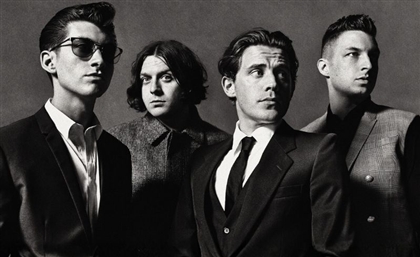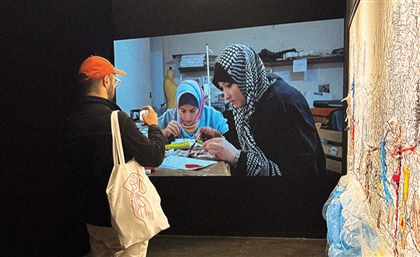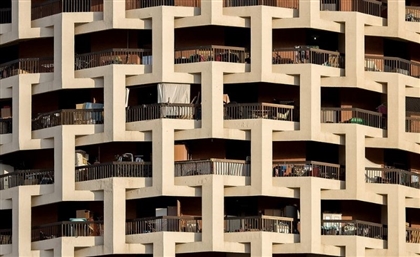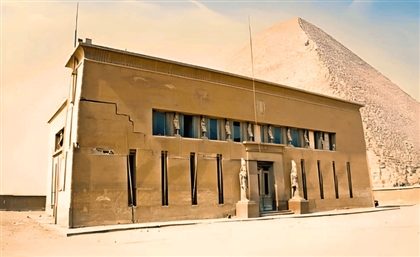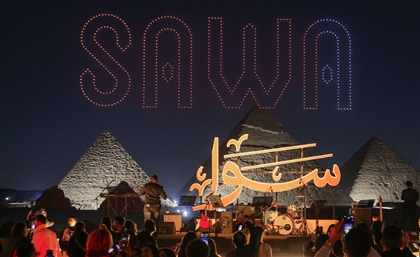A Palestinian Poet on War, Memory & Survival
Haidar Ghazali, a 20-year-old poet from Gaza, observes a city where war lingers - not in bombs, but in what it leaves behind.
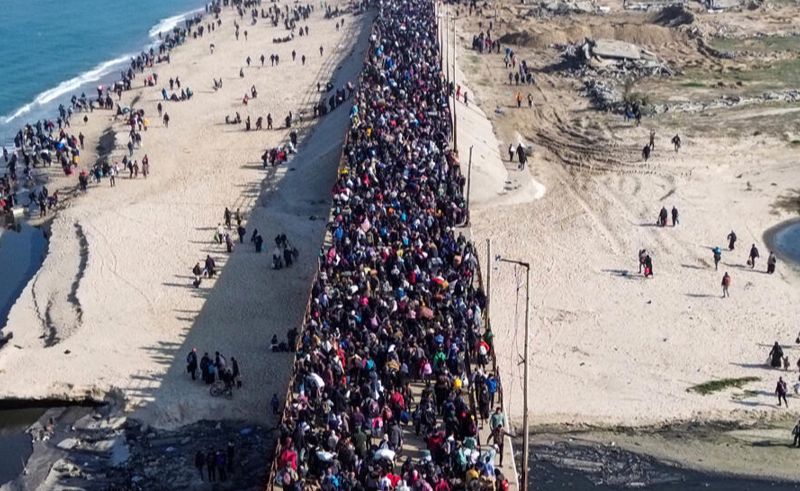
The morning after the ceasefire went into effect, Haidar Ghazali walked through the ruins of Gaza. The truce had been announced at 8 AM by men in distant capitals, but the silence it brought was not one of peace - it was something heavier. A silence filling the gaps between buildings, in the spaces where homes used to be.
The air was thick with the smell of concrete dust and something bizarrely pungent, almost like decay. The streets were no longer streets but corridors of wreckage, where walls collapsed into themselves, where shops had their insides eviscerated open, spilling scorched tin cans and shattered glass onto the ground. Everywhere.
The tents in the displacement camps were too thin to resist the cold, too fragile against the coming winter winds.
A grave, an entire family had decided, was better than a tent.
They had spread blankets inside the tomb, curled their bodies where the dead once lay. The grave was solid, its walls unbroken. The marble was cold, but it stood against the wind.
A grave is better than a tent, anyway
Amid the ruins, people moved like zombies, searching, not for their dead - that’s a story for another time - but for a way to stay alive. The city had been hollowed out completely.
The war ended at 8 AM on a Sunday. At least, that’s what they called it, a war with an ending. But Haidar Ghazali knew that war didn’t end just because someone announced a truce.
The city Haidar had known was gone, but what he was seeing was something else. This was not destruction. This was what came after it.
Haidar Ghazali, an aspiring poet living in northern Gaza, is 20 years old. Before the war, he had been a university student, studying English literature and translation. He had completed a year and a half before lectures turned into distant memories. He still wanted to finish his studies - maybe study political science after, and maybe leave Gaza to do it.
His classes continued online. A different kind of exile, but exile nonetheless. Like the city around him, his future had been reduced to fragments - what remained of possibility, what could be salvaged.
It wasn’t the education he had imagined. But then, nothing was.
RESISTANCE IN THE FORM OF A MEMORY
The streets of Gaza were quieter now. Not peaceful, never peaceful, but quiet in the way a city is when it is counting its dead, measuring the weight of its losses.
Haidar Ghazali wrote about that near memory of war, not as nostalgia, not as an elegy, but as something still breathing.
"Memory is the weapon I wield against erasure, it is neither a comfort nor a burden—it is a reservoir that unveils the crimes of occupation and the illegitimacy of its presence on a land that was never without its people."
Still, memory was not just resistance. It was something more insistent, something that resurfaced without warning. Something that suffocates; it was in the smell of wet concrete after a missile strike, in the way dust moved through broken windows, in the books pulled from the rubble - charred at the edges but still intact. A child’s shoes, both half-buried in ash.
It was in the smallest details. A sore wound that coalesces only to uncoalesce:
جسدي صغيرٌ
ليحمل كل هذه المقابر
لكن يا الله
حتّى الأرض
تستريح من أمواتها
وأنا أذوب في الذكريات
Translation (English):
"My body is small to
carry all these graves.
But, oh God,
even the earth
reclaims its dead,
while I dissolve into memories."
THE WEIGHT OF WAITING
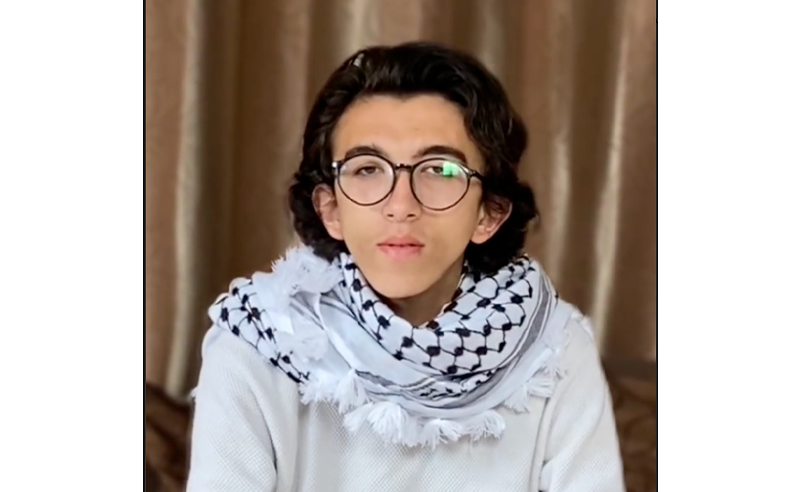
War in Gaza arrived in the form of waiting.
Haidar Ghazali’s poetry in the memory of the war that had just ended lingers in the mundane, in the details that war warps - lines, forms, bureaucracy, impending missiles, stretching across generations.
أقفُ في طابور "وكالة الغوث"
أحدّثُ بيانات العائلة
ضاع صباحي تحت الشمس
أتأفف بين أشخاصٍ يخرجون عن الطابور
حديقةُ المدرسة مقبرة
الفصول الدراسية، بيوتٌ صغيرة لا رائحةَ لها، ولا ذاكرة
أخيراً جاءَ دوري، تلحظُ الموظفةُ جبيني يتصبب عرقا
منذ متى تقف هنا؟
منذ 1948
Translation (English):
"I stand in line at UNRWA,
updating the family records.
My morning wasted under the sun,
grumbling among people breaking the queue.
The schoolyard is a graveyard,
the classrooms are tiny homes,
without scent or memory.
Finally, it’s my turn.
The employee notices the sweat dripping from my forehead:
‘How long have you been standing here?’
‘Since 1948.’"
“To stand in line is to inherit a history of displacement, to carry the weight of a home that has been lost and rebuilt too many times to count. The past of Palestine lingers in its present, into the routines of survival.”
But war does not only turn homes into ruins. It turns time into something shapeless.
يا أقداري الصعبة
من الانتظار
انتظرتُ الحياة
فلم تأتِ
انتظرتُ السعادة
فلم تأتِ
انتظرتُ الحبّ
فلم يأتِ
كان لا شيء في قائمة القادمين
سوى الموت
انتظرته كل ثانية
ولم يأتِ هو الآخر.
Translation (English):
"Oh, my difficult fate
of waiting,
I waited for life,
but it never came.
I waited for happiness,
but it never came.
I waited for love,
but it never came.
There was nothing on the list of arrivals
but death,
I awaited it every second,
yet it too never arrived."
There is no movement forward, only an existence stretched between what was and what will never be.
The ceasefire may come. The bombings may stop.
“The waiting never ends. Displacement fractures the very fabric of community. The concept of home, once a sanctuary, is eroded into a transient idea—something fleeting, something that exists only in memory, something to always wait for.”
Helen Fein, in her book ‘Genocide: A Sociologiocal Perspective’, mentioned that when a group is systematically displaced, its members are cast outside the “universe of moral obligation,” leading to a social and moral isolation that perpetuates trauma across generations. Entire generations, raised in camps and ruins, inherit a fractured sense of belonging, where "home" becomes more of a myth than a tangible reality.
POETRY AS RECORD
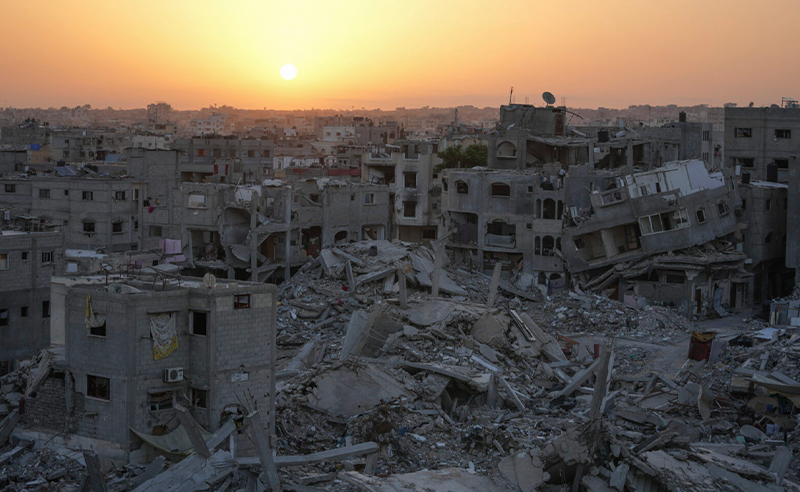
Haidar Ghazali did not believe in poetry as a refuge. Not anymore.
"Poetry is not a comfort, it is a weapon, a record, a wound."
He wrote because there was no alternative. Because if he did not write, the silence would be filled with something worse.
Once, he had written about an Israeli soldier in love. A soldier who could massacre children by day and return to his lover’s arms by night. The contradiction was not surprising.
Occupation required compartmentalization. It required the ability to separate the violence of war from the tenderness of an embrace. To step over bodies in the morning and hold a lover’s face in the evening. To detain a father at a checkpoint and return home in time to kiss one’s own child goodnight.
But it was not just compartmentalization. It was conviction.
“It was knowing - without hesitation - that the people on the other side of the rifle were not quite people. That their lives were incidental, their deaths preordained. That the erasure of their homes, their cities, their names was not an atrocity, but a function of maintaining order.”
A soldier could destroy a family’s home with the push of a button and later sit under the warm kitchen light, passing dishes around the table, speaking of the future. It was never cognitive dissonance. It was discipline. It was doctrine.
كيف تعرفُ أنّك عاشقٌ من إ̶س̶ر̶ا̶ئ̶ي̶ل̶؟
ليس عليكَ أن تهدي حبيبتك وردة
من السهلِ جداً
أن تسرقَ حقل ورد.
ستعود من مذبحة الصغار
إلى صدره
ا تناديها: يا طفلتي
لستَ عاشقاً مجنون
اً لتُقبّل ثغرها الأحمر
على أيّ حالٍ
تحبُّ لون الدماء
Translation (English):
"How do you know you are a lover from Israel?
You don’t need to gift your beloved a flower;
it’s so easy
to steal an entire field of flowers. Y
ou will return from a children's massacre
to her embrace,
calling her: My little one.
You’re not a mad lover
to kiss her crimson lips;
anyway,
you love the color of blood."
THAT CALL AT 11 P.M.
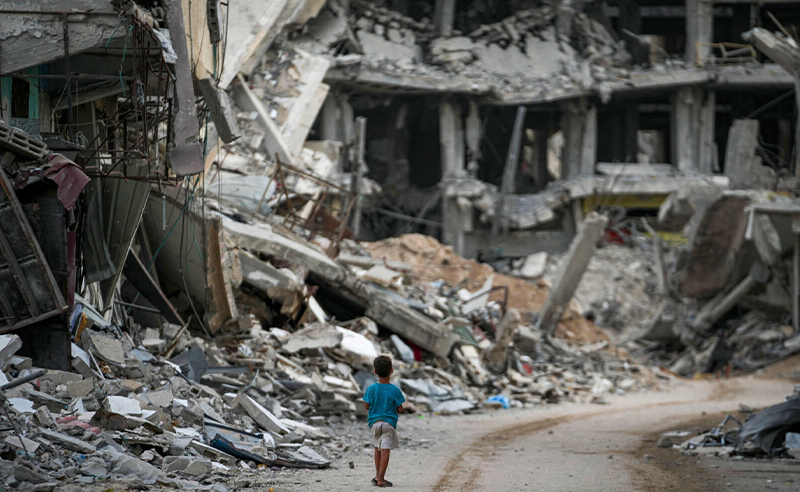
November 15th, 2023. (A month into the genocide)
It was 11 PM. Haidar’s house was silent, or at least everyone was pretending it was. You slept when you could no longer be afraid. That was how it worked.
Outside, the explosions never stopped. Haidar lay staring at the ceiling, trying to imagine what it would feel like if it collapsed onto his chest. He thought about air—how a person could be so full of ideas and memories, yet so easily suffocated. In a matter of seconds.
"Don’t ask me how many bodies make a massacre. Every life taken is a massacre of its own."
His mother was listening to the radio, waiting for the night to end. Then someone on the broadcast said it—a phrase meant to inspire, but it didn’t.
"We salute our resilient people."
She turned it off with quiet frustration.
Then the phone rang. A private number.
Everyone knew what that meant.
His mother rushed into the living room where Haidar, his father, his brothers, and his uncles were lying down. She shoved the phone into his father’s hands.
"A private number," she said.
His father hesitated before answering.
"Hello?"
A voice spoke, clear, emotionless.
"Is Najwa’s husband there?"
Najwa. Ghazali mother’s name.
Her pupils widened in fear. They knew her name.
"Yes," his father said.
"The IDF is close to your area now. You have 24 hours to leave. We’re going to destroy your neighbourhood. Have a good night."
That was it.
No urgency. No argument. Just a transaction. Just an instruction.
Haidar barely heard his family talking after that. His father told everyone to discuss it in the morning. But the words kept repeating in his mind:
"We’re going to destroy your neighbourhood. Have a good night."
By morning, the family had made their decision.
They would not leave.
They knew what it meant. Leaving the north meant exile. It meant joining the millions who had left before them, believing it was temporary, believing they would return. They had learned from history. Return was never promised.
And they knew something else.
There were no safe zones in Gaza. No shelter, no sanctuary, no place beyond the reach of the missiles. The only choice was where to wait for them.
The radio still played in the background, voices filling the room with statements from officials, declarations of strategic advances. The war was described in tactical terms, like a scheduled operation.
Mowing the lawn
A phrase meant to make destruction sound mechanical. Necessary. A population management strategy. The implication was clear: This was not war. This was maintenance. But this time on a greater, unimaginable scale.
"Supporting Palestine shouldn’t begin and end with each wave of genocide. The occupation is a system of daily oppression, land theft, home demolitions, executions at checkpoints for nothing but suspicion."
This genocide was only one chapter. The struggle was longer than that. It did not begin with the bombs. It would not end with them.
"Palestine’s struggle is not just genocide. It is occupation."
Ghazali looks young but does not feel young. His glasses sit slightly too big on his face, their thick lenses magnifying his gaze when he lowers his eyes to think.
And Haidar always thinks before he speaks.
Not out of hesitation, but out of a need to be sure. He is still shaping his opinions, still searching for the full picture.
He talks, for example, about the triumphs of Oslo, but reads Edward Said to understand why someone so prominent would hate it so much. He listens to both sides - not to be neutral, but because he wants to know before he decides where he stands. He is still experiencing life like that.
He is not interested in easy conclusions. He does not take positions lightly. He does not argue for the sake of argument.
Haidar does not just seek knowledge - he tests it. He wants to understand, not just inherit ideas.
He speaks slowly. Thoughtfully. Not because he doubts himself, but because he refuses to settle for easy answers.
ON FAITH, CHAOS, HUMANITY
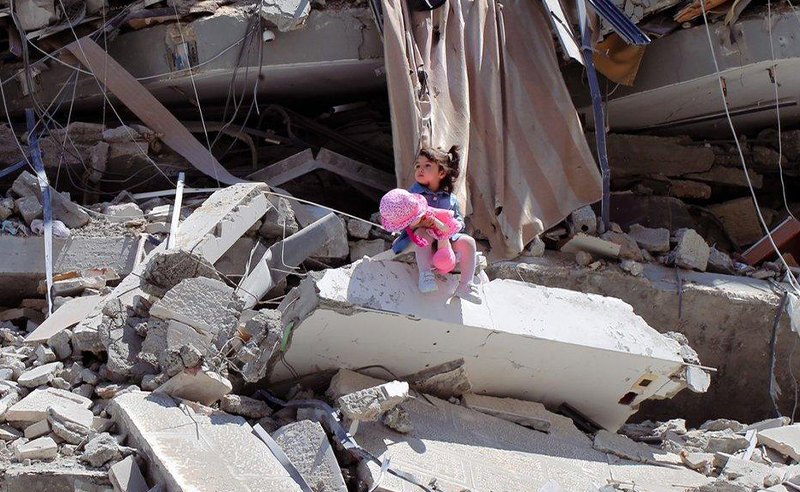
Faith, like everything else, had changed.
Before, Haidar had not thought much about it. It was there, like air - unnoticed until the moment he had to fight for it.
Haidar Ghazali does not speak of faith and humanity as certainty. He speaks of it carefully, like something he is still trying to untangle.
In war, people spoke of destiny. ‘That Gaza was meant to burn. That those bodies left under the rubble would find peace elsewhere. That their deaths were tragic, yes—but written.’
He did not reject faith, but he rejected that.
"This is the exact thing I lived through and witnessed—who said we are destined to burn in tents, who said our bodies should be consumed by cats and dogs, who said it is our fate to lose a city entirely."
الله الذي عرفته
في حضن أمي
وجدائل بنات المدارس
وفرحة البائعين
حين يجمعوا غلّاتهم
لا يحبّ الدماء.
Translation (English):
The God I knew
in my mother’s embrace,
in the braids of schoolgirls,
in the joy of vendors
counting their earnings—
does not love bloodshed.
But there is one thing Haidar had lost faith in. He had no faith in a humanity that allowed genocide to unfold in real-time, without interruption or consequence. A humanity that could not even stop the bullets for a second.
Humanity, as a global force, did not save them, though some tried.
"I have lost faith in a humanity that, to this moment, has been unable to stop the bullets for even a second."
In the ruins, he still saw something else.
“A three-year-old girl named Naya, insisting on giving water to a street cat. Doors opening for strangers. Bodies being carried and buried before the wind and animals could take them. Within genocide, we were more human than necessary."
This did not mean that those who survived were faultless. In a place where only a handful of aid trucks entered each month, survival was not just endurance - it was struggle, desperation and violence.
Even among the displaced, there were the hungry merchants, the ones who hoarded what little arrived. There were people killed over stolen aid. The war did not end human weakness. It magnified it.
But within Gaza, at least some people still tried to save each other.
‘And yet, the missiles still came.’
It did not matter how many doors were opened. How many bodies were buried before the wind could take them. How many times people pressed water into another person’s hands.
Still, the sky burned. Still, the buildings fell. Still, the earth swallowed more than it could hold.
الصواريخ تأتي من السماء، والمطرُ الوحشي
لا تخبروا الأطفال أن الله أيضاً هناك
Translation (English):
"The rockets come from the sky, the savage rain.
Do not tell the children that God is there too."
WHAT HAPPENS AFTER THE BOMB STOPS?
Haidar Ghazali moves through this aftermath with the quiet awareness of someone who has seen this before.
"This is not the first time Palestinians have endured such a catastrophe," he says. "We know what happened during the Nakba, the forced displacement, the destruction."
The war did not just destroy buildings. It rearranged memory.
People walk through the city as if seeing two versions at once - what remains, and what should have been there.
There is no need to explain what is missing. Everyone knows.
"Displacement is not merely a transition from one place to another," Haidar says. "It is a forced exile from the intimacy of home into the cold indifference of the streets. Gaza does not forget. The ruins do not forget. The people do not forget. Because forgetting is another kind of loss. Because forgetting is how history repeats itself. Because forgetting is how the world moves on while Gaza waits for the next war.’
The war has ended. That is what the world says.
The headlines shift. The urgency fades. The same voices that once debated numbers—of the dead, of the displaced, of the bombed-out homes—now move on to other crises, other breaking stories.
But Haidar Ghazali knows better.
Gaza does not experience war the way the world does. It does not have clean breaks, marked beginnings, or definite endings. The bombings may stop, but the aftermath is just another version of war. A war in waiting.
"Even after the genocide has stopped," Haidar says, "my people now live displaced, without shelter, without possessions. They return from tents in the south to the same tents in the north, without any humane conditions, without any reconstruction in sight."
Gaza remains a city in exile, even within its own borders.
The world looks at it as a catastrophe that has passed. A tragedy to be archived. A war that had a beginning, a middle, and - most importantly - an end.
But Haidar understands that the end of a bombing campaign is not the end of an occupation.
"The only real hope," he says, "is in the shift of global consciousness, in the free people of the world who may shape a future that is more just."
But hope cannot depend on the world alone.
For Palestine to move forward, Palestinians must be unified.
"There is no future without a single Palestinian authority," Haidar says. "It is the only way to confront the occupation. It is the only way to build something lasting. Without it, we will always be vulnerable—not just to military aggression, but to political erasure."
THE FUTURE HAIDAR IMAGINES
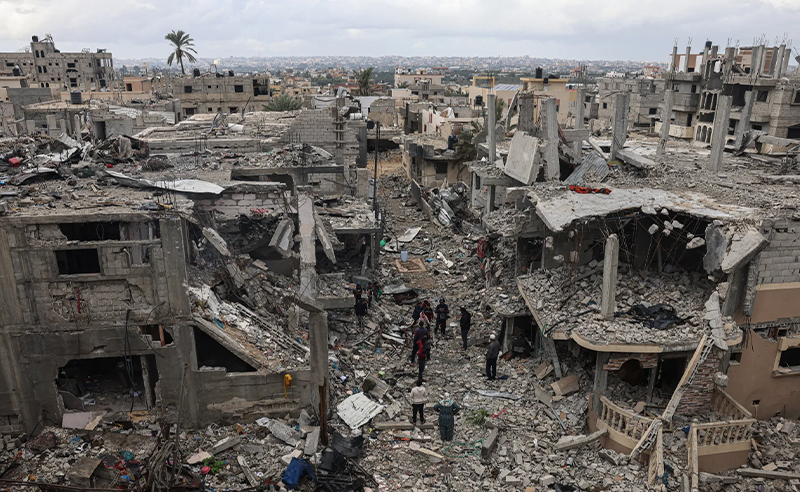
If paradise is the promise, Haidar Ghazali’s requests will be strange.
إن كان قدري الجنّة، ستكون طلباتي غريبة
سأعيدُ الفيلم كلّه
وأكبرُ بين حمقى يتسمّرون في وجهي
ينصبون لي الفخاخَ
جيّدٌ أن أسقطَ في بعضها
Translation (English):
"If paradise is my fate,
I will replay the entire film,
growing up among fools glued to my face,
setting traps for me—
and it’s good that I fall into some of them."
He does not dream of an afterlife where everything is effortless. He wants it to mimic normal life. He wants to build.
أريدُ المشقّة
وأنا أبني بيتي الأوّل
غرفةَ أطفالي
وحديقةَ المنزل
وأريدُ لكل حجرٍ أنام تحته قصة وجع
يا لها من راحة
Translation (English):
"I want the hardship
of building my first home,
my children’s room,
and the garden of my house.
I want every stone beneath which I rest
to hold a story of pain.
What a comfort."
His poetry does not seek grand victories or sweeping resolutions. It longs for the mundane, for the small details of a life uninterrupted.
Haidar does not long for heroism. He longs for the right to be ordinary.
تلكَ أيادٍ خلقت للحب
وللصخور أيضاً
"These hands were made for love—
and for rocks too."
- Previous Article Wegz Releases Unapologetic EP 'Gadwal El Darb'
- Next Article King Mariout Gas Discovery Estimated at 4 Trillion Cubic Feet
Trending This Week
-
Feb 23, 2026








